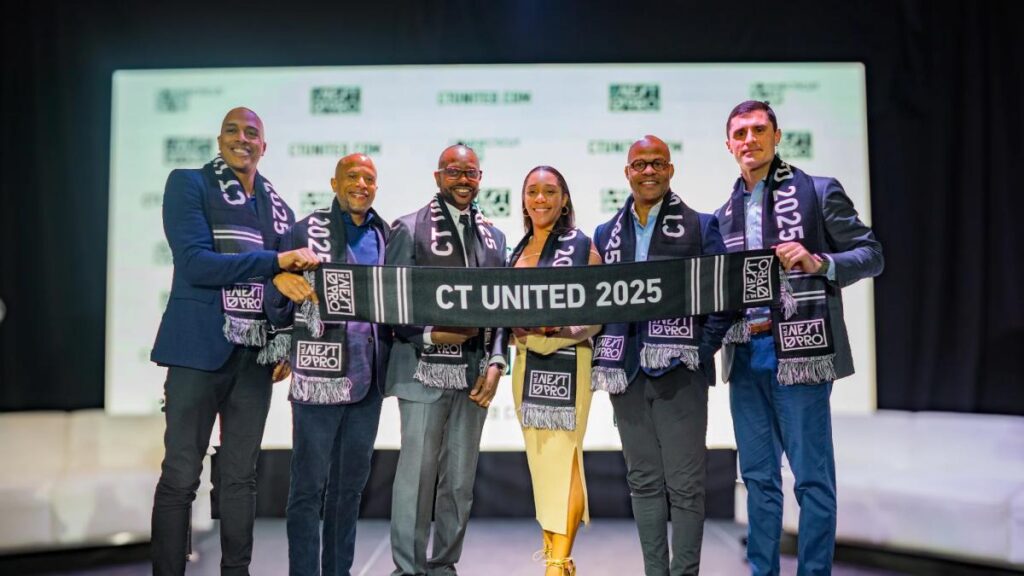Connecticut is home to millions of sports fans and very few professional sports teams. Millionaire tech entrepreneur André Swanston, a graduate of the University of Connecticut and Ridgefield resident, has ambitions to change that.
On Jan. 9, Swanston and representatives from Major League Soccer’s development league, MLS NEXT Pro, announced the league’s newest team, Connecticut United Football Club, which plans to play in a new waterfront stadium in Bridgeport beginning in 2025.
Swanston founded the team’s ownership group, Connecticut Sports Group, and is leading efforts to secure approvals for the stadium complex, a development that includes a hotel, retail and dining properties, community park space and housing on the site of a former dog-racing track.
The stadium proposal received approval from Bridgeport zoning officials in November, Swanston told CT Mirror in Hartford.
The University of Connecticut Center for Economic Analysis estimated the development could drive more than $4 billion in economic value for Bridgeport over the next 25 years, with over 2,000 jobs created during the construction phase and 1,000 positions ongoing at the site.
“This will have a far more profound economic impact than any of the other sports or entertainment investments that the state has made in over a quarter century,” Swanston predicted.
To support those teams, he and CT Sports Group will be looking for corporate sponsors from among Connecticut’s strong contingent of Fortune 1000 companies, but they also anticipate seeking public funding.
“We’re in the early stages of trying to create what we think can be a great public-private partnership on this,” Swanston said in speaking to the Mirror. “I can’t say what dollar amount we’re going to need from the state, or ask for, but I can tell you there will be a higher percentage of private capital than any of the other large stadiums or entertainment venues.”
MLS NEXT Pro President Charles Altchek believes the 2026 FIFA World Cup, hosted across North America, could amplify the economic impact of Bridgeport’s new team and stadium by shining a “global spotlight” on the sport in the United States.
“Our job in professional soccer is to get ready for that moment, to get ready for that energy, and to have great projects like we’re going to have in Connecticut,” he said.
A broad body of research examining the effects that sports teams and stadium developments have on local economies almost universally finds their impact to be minimal. But Swanston said not all of the local effects are captured just by looking at new jobs and revenue, generated by visiting fans paying for parking or eating at local restaurants and bars.
For example, the CT United stadium development includes green space that will allow pedestrians headed to mass transit hubs to walk a shorter route, reducing their commuting time, he noted.
And of course, it is difficult to quantify the impact of local pride in a hometown team, he said.
“There’s so many things that we’re really excited about that we think are kind of transformational,” he said.
Owner Wants Collaboration in Building Stadium
So far, Swanston and his wife Michelle — both former Division I college athletes — have “self-funded” the effort to establish CT United FC and seek local approvals for the stadium, but the investment pool is expected to grow. Several sources of private funding, from family offices to private equity groups, have expressed interest, he said, and later this year, the club plans to announce an “expanded ownership group.”
Swanston became wealthy through his startup technology company Tru Optik, which gathered user data from streaming websites like BitTorrent. One of the earliest endeavors to amass metrics on audience streaming preferences, the company’s product became very valuable to a wide range of advertisers and content developers.
In 2020, he and his partners sold the company for more than $100 million.
Swanston’s been able to tap into his expertise in evaluating the market potential for professional sports in Connecticut. He found that Connecticut fans spend upwards of $1 billion on sports and entertainment each year and are more active than most on streaming platforms, where MLS broadcasts much of its content, including its minor league matches.
Swanston wants CT United FC to field a full-fledged MLS team within a few years — a “no brainer,” he said, given how rapidly the sport’s popularity is growing among U.S. fans.
Altchek said the “blueprint” for the most successful MLS clubs combines a committed ownership group, an enthusiastic local fan base, and an attractive facility that can draw a crowd.
“Getting stadiums built is always a lot of work and requires a tremendous amount of collaboration and partnership between public and private entities,” he said.
Swanston is confident it will happen — so much so, he’s already thinking beyond the MLS.
The new Bridgeport stadium also could offer an opportunity for the National Women’s Soccer League to expand, he said.
“What market in America has culturally supported women’s sports over the last 25 years better than Connecticut?” he said, pointing to the success of the UConn Women’s basketball team and the WNBA’s Connecticut Sun. In addition, Swanston even sees potential for professional lacrosse at the site.
The MLS NEXT Pro league launched in March 2022 and will soon count 29 teams as members, most of which are affiliated with existing MLS clubs.
NEXT Pro teams serve as a connection between youth academies and the major league professional teams. Promising athletes might advance from their club’s academy and play for a NEXT Pro team before joining the professional squad. Or “first team” MLS players may come down to their NEXT Pro unit for a stint, creating a professional-level atmosphere ideal for player development.
Read the full article here











